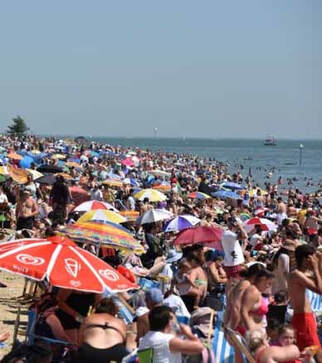 Not Cowes or Inverloch. Sunderland-on-sea.
Not Cowes or Inverloch. Sunderland-on-sea. SO THEY have gone at last, and peace descends once more. The place is ours again.
The exodus started on the Friday before the long weekend with a trickle of caravans and utes stacked high with mountain bikes and kayaks. By Australia Day it was a cavalcade.
And this was Wonthaggi, the poor cousin. I can only imagine how it was in Inverloch or on Phillip Island. It must have felt as though the island floated a little higher as they left.
I don’t begrudge them their few weeks beside the sea. They’ve had a tough year and there’s another one ahead. They needed the sunshine and fresh air.
And we had just emerged from our own cocoon. While Melbourne was in lockdown we had the place to ourselves. the empty beaches, the big skies, the silent woods. We grew mystical and other-worldly.
This year seemed worse. Warren said he’d heard that where the island population usually swells to 100,000, this year there were something like 120,000 people.
Our dear little towns couldn’t cope this summer. Too many cars, too many people. The sound of horns. “They’re so rude!” locals kept complaining. It’s standard practice in these parts to stop to let someone back out onto the street. The courtesy is acknowledged with a wave. Good feelings all round. The newcomers aren’t aware of the ritual. They push in and act as if it’s their due.
A Cowes retailer once described the holiday period to me. The week after Christmas was a nightmare. The holiday makers were rude, impatient and demanding. “By the second week they’ve mellow and they’re the loveliest people! And then they go back to the city and the next lot arrive. And for the first week they’re so rude and impatient!”
Darren took his boys to the Cowes beach. They drove round and round the block looking for a parking spot then drove home again to the paddling pool in the back yard .
You expect that on the island but I had a similar experience at Harmers one afternoon. There must have been 30 cars in the middle car park. They were backed up along the narrow dirt road. Admittedly it was a, hot, low tide, perfect conditions, but still it was unsettling. I had to drive in to turn around, which involved a 12-point turn. Some people who were already there glared at me! I had an inkling of how the Gweagal people felt as they watched Captain Cook acting as if he owned Botany Bay.
I sneaked out to the beach early one evening and found the first car park empty. Once past the creek at Wreck Beach, where the hooded plovers are nesting this year, I let Matilda off the lead. It was a still evening and blissful. We both needed it.
As we headed back, two men were walking along the beach with three dogs. One of the dogs was happily gambolling towards the roped off area and two anxious plover parents.
I headed the dog off and spoke harsh words to it. The owner took exception.
The usual debate ensued. His dog didn’t chase birds. She was a good dog. There are plovers everywhere. And the clincher. “I’ve lived here all me friggin’ life,” he said. “How long have you lived here?”
When I got back to the car park and saw his big black beast of a ute – super-size tyres and super-size headlights for spotlighting animals – I decided to scratch the shiny black duco.
Then I decided not to. I had a sneaking sympathy for him. A beautiful evening, a tinny, a mate and a dog, and some nutter ruins it by yelling at ya dog. I knew he was angry with me for a lot of things, not all of them logical.
My mother used to quote a line from a poem. I can’t find it on Dr Google but it went something like this: “For who can measure the pain of someone who has loved a place that the world has power to destroy.”
This summer I think we all saw the fragility of the places we love, and how easily they could be destroyed by too many people.
Thank you for visiting! Come again – but not till next summer!